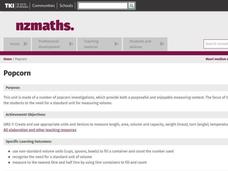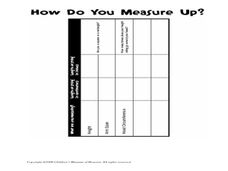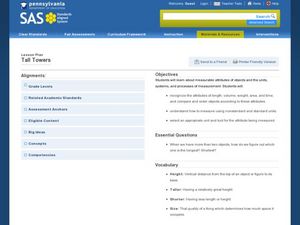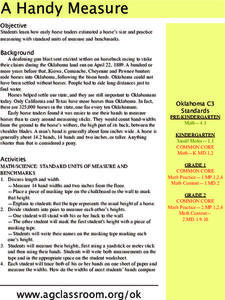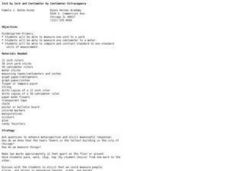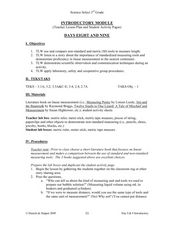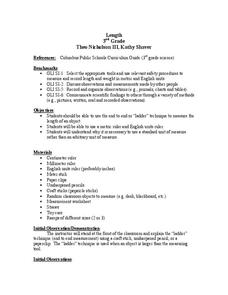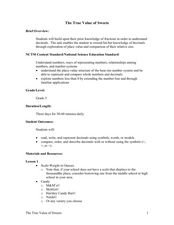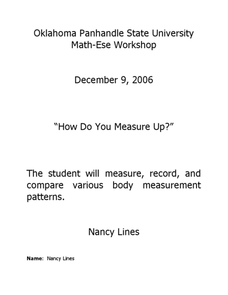Curated OER
Measurement Benchmarks and Conversions
Students explore the concept of measurement. In this measurement lesson, students determine appropriate units of measure for objects in the classroom. Students discuss the importance of measuring objects with the same unit of measure.
Pennsylvania Department of Education
Adding Common Fractions
Fourth graders estimate various measurements. In this lesson on measurement, 4th graders estimate the length and mass of multiple objects. Students discuss the difference between a guess and a reasonable estimate and discuss using...
Curated OER
Measuring and Comparing Mass With a Balance
Fifth graders observe and demonstrate measuring and comparing mass using a balance. They discuss the definition of mass and the units of measurement used, observe how a balance is used, and with a partner balance the baskets of the...
Curated OER
Make Me Metric
Sixth graders explore standard and nonstandard measurement. In this measurement instructional activity, 6th graders estimate the lengths of different objects and write about their observations during measuring. Students work in...
Curated OER
Area Unit
Students solve the area for parallelograms,squares, rectangles, trapezoids, and triangles. In this geometry lesson, students compare and contrast two dimensional shapes and apply their properties to solving real life scenarios. This is a...
Curated OER
Popcorn
Hungry learners perform a number of popcorn investigations. They investigate the volume of popcorn kernels before and after popping. They use both standard and non-standard units of measurement to measure the kernels.
Alabama Learning Exchange
Are You a Square or a Rectangle?
Discover the difference between standard and non-standard units of measure with your class. They differentiate between rectangles and squares, read a book, measure a peer's height. They then discuss measurement methods, make...
Curated OER
How Do You Measure Up?
Students measure their body. In this measurement instructional activity, students use a string to measure their height and the circumference of their head. They record this information on the worksheet provided and answer questions as a...
Curated OER
Look At Those Leaves!
Students collect, measure and classify leaves. In this inquiry-based sorting and classifying lesson, students look at various types of leaves they have collected and measure them using a standard unit of measurement. Next, they relate...
Curated OER
Tall Towers
Linear measurement is the focus of this math lesson. Youngsters work in groups to build towers with blocks. They build towers represented on index cards and determine how many blocks taller one tower is.
Curated OER
Making Simple Conversions
Young scholars explore the concept of measurement as it relates to equivalencies. They complete simple conversions using visual models of measurement units, and record their answers in a two-column table.
Curated OER
A Handy Measure
Hold your horses! Young learners discover the history behind measuring the height of horses "by hands." They also study the history of Oklahoma, and how horses played such an important role in settling the state. An excellent worksheet...
Carnegie Mellon University
Consumer Preferences in Lighting
What is a watt? This tongue-twisting, mind-bending question and others are answered through this lesson plan on the different lighting options available. With the support of a PowerPoint, teach your physical science class about units of...
Curated OER
Operation Spaghetti
Find the math in recipes. Young chefs will follow a recipe and investigate the total cost for materials. They measure amounts of food necessary for the recipe and compute the per person cost.
Curated OER
Inch by Inch and Centimeter by Centimeter Extravaganza
Students use both standard and metric measurement. They compare and contrast standard to non-standard units of measurement.
Curated OER
Introductory Module
Third graders examine the non-standard method of measurement and compare it to the metric system of measurement. In this introductory module lesson, 3rd graders discover the scientific observation. Students also develop communication...
Curated OER
Length
Third graders examine and explore a variety of ways to measure length. They discuss how to measure large objects using the end-to-end method, and in small groups measure the length of the room using the end-to-end method with a...
National Security Agency
Partying with Proportions and Percents
Examine ratios and proportions in several real-world scenarios. Children will calculate unit rates, work with proportions and percentages as they plan a party, purchase produce, and take a tally. This lesson plan recommends five...
Curated OER
The True Value of Sweets
Measure your pupil's learning in a lesson designed to explore decimals by weighing different candies on a scale and recording the weight. Small groups then compare and order the decimal weights on a number line to show their...
Curated OER
Length and Volume Exploration
Young scholars explore how to measure length and volume. They compare and order objects according to their measurable attributes and measure items using non-standard units. Students put 4 pencils in order from shortest to longest after...
Curated OER
How Do You Measure Up?
Students explore the concept of measurement, modelling the increments on a standard ruler using cubes and grid paper. They identify the length of a line to a designated standard unit and measure specified body parts.
Curated OER
The Global Precipitation Measurement Mission (GPM) Lesson
Introduce your class to one of the ways that technology is benefiting humanity. The Global Precipitation Measurement Mission involves the data collected by nine satellites from different countries with a united focus on studying world...
Curated OER
Measuring Angles in a Quadrilateral
High schoolers explore quadrilaterals in this geometry lesson. They will draw a quadrilateral, measure the angles, and find the sum of the measures of the interior angles using Cabri Jr. The interactive capabilities of Cabri Jr. allow...
Curated OER
Geometry- Hands and Feet
Students identify units of measurement. In this measurement lesson, students predict the length and width of their hands and feet. Students discuss their findings and if their predictions were correct.





